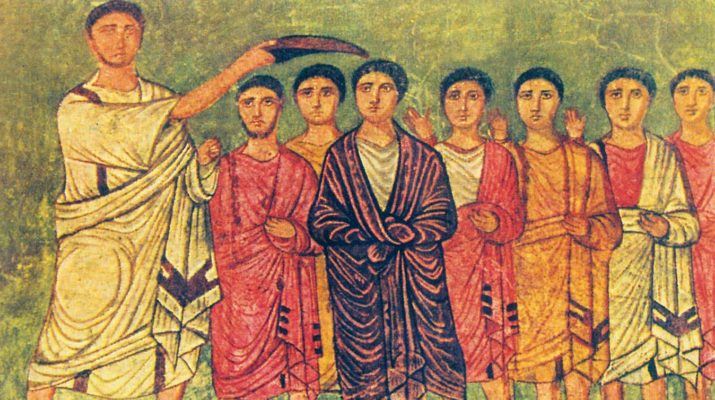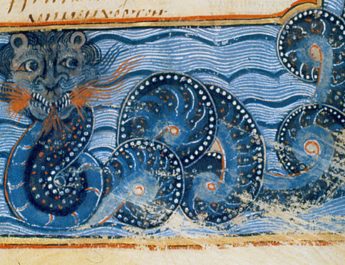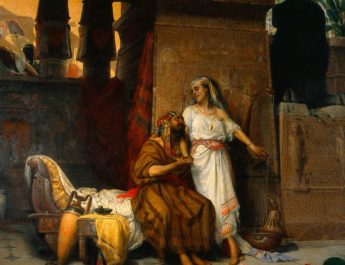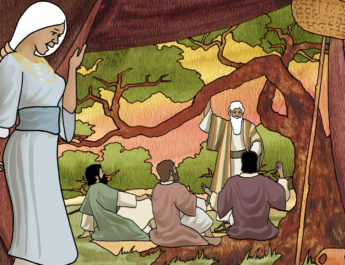1 Samuel 16:1-13
Narrative Lectionary
BibleHub
1 The LordA said to Samuel,B “How long will you grieveC over Saul?D I have rejectedE him from being king over Israel.F
Notes on verse 1a
A “Lord” = YHVH. From havah (to be, become) or hayah (to come to pass, become, be). This is the name of the God of Israel, the self-existent and eternal one, the tetragrammaton. This pronunciation has been lost to time so “Lord” is generally used in its place.
B “Samuel” = shemuel. From shem (name, fame, renown; indicating something essential about a person; honor, authority, or character); {may be from sum (to put, place, set)} + el (God, a god) OR from shama (hear, call, consent, or consider; implies listening intelligently, giving attention; obedience and action are often implied) + el (God, a god).This is Samuel meaning either the “name of God” or “heard of God.”
C “grieve” = abal. This is mourn, lament, or bewail.
D “Saul” = shaul. From shaal (to ask, inquire, beg, borrow, desire, request; can also mean demand). This is Saul or Shaul, meaning “asked of the Lord.”
E “rejected” = ma’as. This is to reject, cast away, spurn, despise, refuse, or melt away.
F “Israel” = yisrael. From sarah (to persist, exert oneself, contend, persevere, wrestle, prevail) + el (God or god). This is God strives or one who strives with God; new name for Jacob and for his offspring. This refers to the people and to the land.
FillG your horn with oil and set out; I will send you to JesseH the Bethlehemite,I for I have providedJ for myself a king among his sons.”
2 Samuel said, “How can I go? If Saul hearsK of it, he will killL me.”
Notes on verses 1b-2a
G “fill” = male. This is fill, satisfy, replenish, accomplish, fulfill, confirm, or consecrate. It is fill in a literal or figurative sense.
H “Jesse” = yishay. Perhaps from the same as yesh (being, existence, substance). This is Jesse.
I “Bethlehemite” = beth hallachmi. 4x in OT. From beth lechem (Bethlehem); from bayit (house, court, family, palace, temple); {probably from banah (to build, make, set up, obtain children; to build literally or figuratively)} + lechem (bread, food, loaf; food for people or for animals); {from lacham (to eat, feed on; figuratively, to battle as a kind of consumption/destruction)}. This is a resident of Bethlehem.
J “provided” = raah. This is to see in a literal or figurative sense. It can also be stare, think, view, advise, show oneself. Further, it can mean provide or, as we would say in English “I’ll see to it.”
K “hears” = shama. Rel to “Samuel” in v1.
L “kill” = harag. This is to strike with deadly intent so it can be kill, destroy, murder, or put to death.
And the Lord said, “Take a heifer with you, and say, ‘I have come to sacrificeM to the Lord.’ 3 Invite Jesse to the sacrifice,N and I will showO you what you shall do; and you shall anointP for me the one whom I name to you.”
Notes on verses 2b-3
M “sacrifice” = zabach. This is slaughtering an animal, generally for the purpose of sacrifice. It can mean kill or offer.
N “sacrifice” = zebach. Related to “sacrifice” in v2. From zabach (see note M above). This is animal flesh, which implies a sacrifice. This can be used for the offering itself or for the act of doing an animal sacrifice.
O “show” = yada. This is to know, acknowledge, advise, answer, be aware, be acquainted with. Properly, this is to figure something out by seeing. It includes ideas of observation, recognition, and care about something. It can be used causatively for instruction, designation, and punishment. Here it is in a Hifil (causative) form. So, this would be make known or declare.
P “anoint” = mashach. This is smear, paint, spread, or paint. It can also be to rub with oil or, otherwise stated, to anoint. This implies a consecration. This root verb is where the word “messiah” comes from.
4 Samuel did what the Lord commanded, and came to Bethlehem. The eldersQ of the cityR came to meet him trembling,S and said, “Do you come peaceably?”T
Notes on verse 4
Q “elders” = zaqen. From the same as zaqan (beard or chin – the beard represents old age). This is old, aged, or elder.
R “city” = iyr. From uwr (to awaken or wake oneself up). This can mean excitement in the sense of wakefulness or city. Properly, this is a place that is guarded. Guards kept schedules according to watches. This sense of the word would include cities as well as encampments or posts that were guarded.
S “trembling” = charad. This is trembling, being afraid, or being terrified. It can also refer to moving quickly due to anxiety.
T “peaceably” = shalom. From shalam (to be complete or sound; to have safety mentally, physically, or extending to one’s estate; so, if these things are safe and complete, the implication is that one would be friendly; and, if being friendly, one would make amends and that friendship would be reciprocated). This is completeness, soundness, welfare, favor, friend, good health. It is to be safe and figuratively well, happy, at peace, friendly. Abstractly, it includes the ideas of welfare and prosperity (not in excessive wealth, but in having enough).
5 He said, “Peaceably; I have come to sacrifice to the Lord; sanctifyU yourselves and come with me to the sacrifice.” And he sanctified Jesse and his sons and invited them to the sacrifice.
6 When they came, he looked on EliabV and thought, “Surely the Lord’s anointedW is now before the Lord.”
Notes on verses 5-6
U “sanctify” = qadash. From qodesh (set apart and so sacred; God is different from us and so God is holy/set apart; things we dedicate to God’s service are set apart for God and so they, too, are holy). This is set apart, consecrated, hallowed, sanctified. This is something or someone that is set apart for a holy purpose or use – ceremonially or morally clean.
V “Eliab” = eliab. From el (God, a god) + ab (father, chief, ancestor; father in a literal or figurative sense). This is Eliab, meaning “God is father” or “God of his father.”
W “anointed” = mashiach. Related to “anoint” in v3. From mashach (see note P above). This is anointed, anointed one, or messiah. It is generally someone consecrated like a king, priest, prophet, or holy person.
7 But the Lord said to Samuel, “Do not lookX on his appearanceY or on the heightZ of his stature,AA because I have rejected him; for the Lord does not see as mortalsBB see; they look on the outward appearance,CC but the Lord looks on the heart.”DD
Notes on verse 7
X “look” = nabat. This is to behold, look at intently, consider, or scan. It can mean to have respect or regard someone favorably.
Y “appearance” = mareh. Related to “provided” in v1. From raah (see note J above). This is appearance, sight, vision, or form. It could be the physical act of seeing or an appearance as a thing that is seen. It can also be used of a vision.
Z “height” = gaboah. From gabah (to be tall, high, exalted, proud, haughty). This is high, tall, long, proud, or arrogant. It could also be a high ranking official, someone exalted, or something lofty.
AA “stature” = qomah. From qum (to arise, stand, accomplish, establish, abide; rising against, getting up after being sick or asleep, arising from one state to another, becoming powerful, or rising for action; standing in a figurative sense). This is tall, high, length, or height.
BB “mortals” = adam. Perhaps from adam (to be red, make ruddy); related to adamah (ground, dirt, earth). This is man, humankind, also Adam’s name. It refers to a human individual or humanity.
CC “outward appearance” = ayin. This is eye in a literal or figurative sense so eye, appearance, favor, or a fountain (the eye of the landscape).
DD “heart” = lebab. May be related to labab (to encourage; properly, to be encased as with fat; used in a good sense, this means to transport someone with love; used in a bad sense, it can mean to dull one’s senses). This is the heart, courage, one’s inner self, the mind, or the will. Heart is only used in a figurative sense in the Old and New Testaments.
8 Then Jesse called Abinadab,EE and made him passFF beforeGG Samuel. He said, “Neither has the Lord chosen this one.” 9 Then Jesse made ShammahHH pass by. And he said, “Neither has the Lord chosen this one.” 10 Jesse made sevenII of his sons pass before Samuel, and Samuel said to Jesse, “The Lord has not chosen any of these.”
Notes on verses 8-10
EE “Abinadab” = abinadab. 12x in OT. Related to “Eliab” in v6. From ab (see note V above) + nadab (to offer voluntarily, incite, impel; to volunteer to be a soldier or offer freely). This is Abinadab, meaning “my father is noble” or “father of generosity,” which is to say very generous.
FF “made him pass” = abar. This is to pass over or cross over. It is used for transitions, whether literal or figurative. It can also mean to escape, alienate, or fail. This is the root verb from which “Hebrew” is drawn.
GG “before” = paneh. Literally “before his face.”
HH “Shammah” = shammah. 7x in OT. From the same as shammah (desolation, horror, dismay, waste); from shamem (to be appalled, astonished; to stun or devastate, be destitute). This is Shammah.
II “seven” = sheba. This is seven, symbolic of sacred fullness. Can also be used to imply a week.
11 Samuel said to Jesse, “Are all your sonsJJ here?”
And he said, “There remains yet the youngest,KK but he is keepingLL the sheep.”MM
Notes on verse 11a
JJ “sons” = naar. May be from na’ar (to shake, toss up and down, tumble around). This is a child or a servant. It is a child in their active years so they could be aged anywhere from infancy to adolescence.
KK {untranslated} = hinneh. From hen (lo! Behold! If, though; an expression of surprise). This is to draw attention, show suddenness or surprise, or to emphasize the importance of the coming statement. See! Lo! Behold!
LL “keeping” = ra’ah. This is to tend a flock, pasture, or graze. It can mean to rule or to associate with someone. Figuratively, it can be ruler or teacher.
MM “sheep” = tson. This is a flock of sheep and goats.
And Samuel said to Jesse, “Send and bring him; for we will not sit downNN until he comes here.” 12 He sent and brought him in. Now he was ruddy,OO and had beautifulPP eyes, and was handsome.QQ
Notes on verses 11b-12a
NN “sit down” = sabab. This is turning around, going around; to surround, cast, walk, fetch. It is to revolve or border in a literal or figurative sense.
OO “ruddy” = admoni. Related to “mortals” in v7. 3x in OT. From the same as adom/adam (see note BB above). This is to be red or ruddy, dyed red, or to be flushed.
PP “beautiful” = yapheh. From yaphah (to b beautiful, decorate; root means being bright, which implies being beautiful). This is beautiful in a literal or figurative sense – appropriate, handsome, godly, pleasant.
QQ “handsome” = tob + roi. Literally “good looking.” Tob is good, beautiful, pleasant, agreeable, bountiful, at ease. This word is used for goodness as a concept, a good thing, a good person. This can refer to prosperity and welfare as well as joy, kindness, sweetness, and graciousness. So, this is ethically good, but also enjoyably good. Roi is from raah (see note J above).
The Lord said, “RiseRR and anoint him; for this is the one.” 13 Then Samuel took the horn of oil, and anointed him in the presenceSS of his brothers; and the spiritTT of the Lord cameUU mightily upon DavidVV from that day forward. Samuel then set out and went to Ramah.WW
Notes on verses 12b-13
RR “rise” = qum. Related to “stature” in v7. See note AA above.
SS “presence” = qereb. Perhaps from qarab (to come near or approach). This is among, in the midst, before, the center It is the inward part, whether literal or figurative. It can also be used for the heart, the site of thoughts and feelings. This word is also used as a technical term for the entrails of the animals who are sacrificed.
TT “spirit” = ruach. This is breath, wind, air, cool, spirit. This is wind, which resembles the breath and so this can be used figuratively for life itself or being frail/mortal/impermanent. It can refer to the air of the sky or the spirit.
UU “came” = tsalach. This is pushing forward in a literal or figurative sense. So it could be to break out, to come mightily, to rush, to go over. Figuratively, it could mean to prosper.
VV “David” = David. From Hebrew David (David); from the same as dod (beloved, love, uncle); the root may mean to boil, which is used figuratively to describe love. So, this implies someone you love such as a friend, a lover, or a close family member like an uncle. David’s name likely means something like “beloved one.”
WW “Ramah” = ramah. From rum (to be high, rise, exalt self, extol, be haughty; to rise literally or figuratively). This is Ramah, meaning height.
Image Credit: “David Anointed King by Samuel” from the Dura Europos Synagogue, Syria, 3rd century AD.




